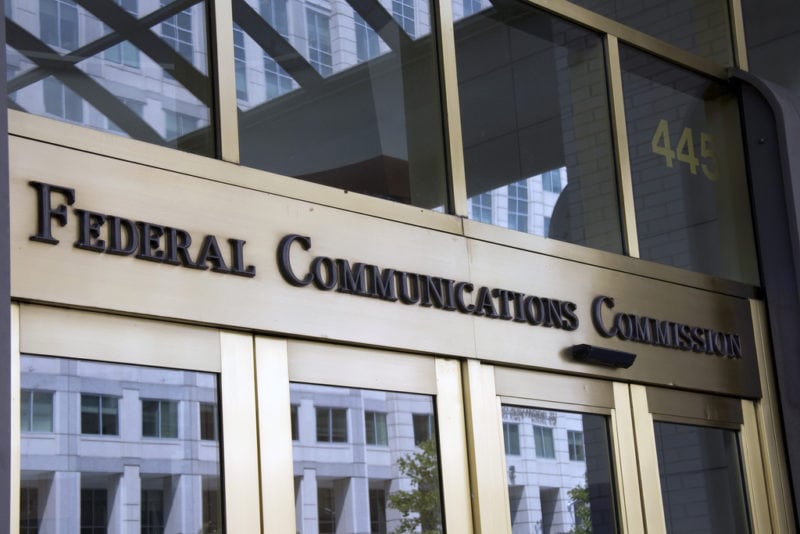C-Band Alliance Fallout: Intelsat FCC Filing Draws Angry Response from SES

Federal Communications Commission. Photo: FCC
The day before Intelsat reported full-year 2019 results that surpassed analysts’ projections, the operator sparked a feud with rival operator SES over an ex parte filing with the FCC requesting adjustments to the agency’s C-band Draft Order, released earlier this month. In the filing dated Feb. 19, Intelsat argued for adjustments to the FCC’s proposed C-band payout plan, timelines, deadlines, and penalties.
In a comment attached to the operator’s FY2019 earnings report and echoed in the FCC filing, Intelsat CEO Stephen Spengler stated that, “the framework as currently drafted greatly reduces the likelihood that the approach under consideration by the Commission would achieve clearing in the accelerated time frames envisioned, while still protecting incumbent satellite services.”
FCC Chairman Ajit Pai announced details of the agency’s C-band draft order during a February 7 luncheon speech. The order proposed acceleration incentive payments to certain C-band satellite operators of $9.7 billion, of which Intelsat would receive $4.85 billion. Pai claimed that $9.7 billion reflected a “fair market value” for the spectrum” and would be sufficient to get satellite operators on board with the accelerated relocation deadlines set for September 2021 and 2023.
Intelsat argues that the incentive payment amount that was identified for Intelsat, should be increased and based on what the operator called, “relative contribution to accelerated clearing … The percentage assigned to Intelsat computes to 50% of the total amount of incentive. This percentage, however, does not accurately reflect Intelsat’s share of the contribution to clearing C-band services to the contiguous 48 states.” Intelsat is arguing for 60-67% of C-Band proceeds, which would greatly reduce the share for other operators of the C-Band Alliance (CBA).
SES, which is a co-founding member of CBA along with Intelsat, quickly issued a heated response to Intelsat’s filing. “SES is disappointed by Intelsat’s eleventh-hour attempt to renounce its commitments made to other CBA members and the Commission over the course of this proceeding, in aid of a transparent and egregious attempt to capture a greater share of the proposed accelerated relocation payments. Having worked collaboratively for a long period of time on this project, this sudden and recent change in direction by Intelsat is both disappointing and not legally compliant. SES will hold Intelsat responsible under its commitments,” SES said in the official company statement.
Jefferies Equity Analyst Giles Thorne commented that the filing and the exchange between CBA operators is not only dramatic, but also noteworthy for the details it reveals about Intelsat’s strategic position in regards to the FCC’s draft order.
“It appears that the [Sen. John] Kennedy intervention has not only got an FCC Chairman to turn-coat, but now also has one-time colleagues turn on each other,” Thorne wrote in a research note. “In the meantime, questions on the C-band was shutdown by [Intelsat] in the prepared comments pending publication of a final order. Some insights leaked through the gaps, though: Intelsat’s CapEx guidance excludes any C-band related clearing costs. Intelsat management’s focus is on attaining an optimal [C-band] order and not on the mechanics of the payments. There could be some folding in of Intelsat core business costs into C-band clearing costs, subject to FCC acquiescence.”
SES declined to comment further on the matter. Via Satellite reached out to Intelsat Vice President of Investor Relations Dianne Van Beber, who replied, “Our filing speaks for itself, and demonstrates that we are working to ensure that the final order achieves the best possible outcome for our customers, our company and the American public. The changes that we are suggesting would allow us to quickly clear spectrum to support 5G deployments in the U.S., creating new high tech jobs and unleashing the economic benefits that will accrue to our country.”
The FCC is expected to vote on the Draft Order at its upcoming Feb. 28 meeting. FCC Commissioners Brendan Carr and Michael O’Rielly have issued statements supporting the Chairman’s draft order, seemingly guaranteeing its passage.
Intelsat’s 2019 full-year and fourth quarter (Q4)results were much less dramatic. The operator reported a Q4 net loss of $115.0 million, or 81 cents a share, compared to a Q4 2018 loss of $111.3 million, or 81 cents a share. Analysts were expecting a greater net loss per share of between 93 cents and 95 cents. The operator’s Q4 revenue fell 4.8% to $517 million, which was also above analyst projections, which had the operator’s revenues falling to approx $501 million.
“Our fourth quarter results reflect the contributions of our new satellites as well as growing revenue streams generated by our Flex managed services, benefiting our network services business,” Intelsat CEO Stephen Spengler said about the results. “Our media business signed a significant new direct-to-home television customer contract in Asia, while the government services business achieved important renewals that will support its stability in 2020.”
The operator’s Network Services business now makes up 39% of Intelsat’s total revenue, which is closing the gap with Intelsat’s more traditional Media business, which makes up 41% of the operator’s total revenue. In 2018, Network Services’ total revenue share was 37% with Media taking up 43% of Intelsat’s total revenues.